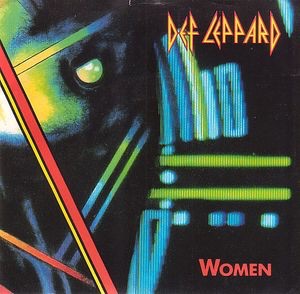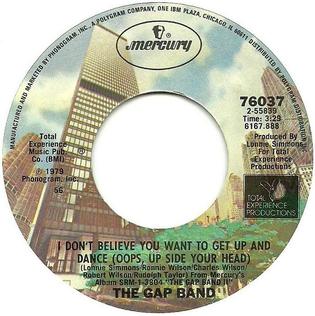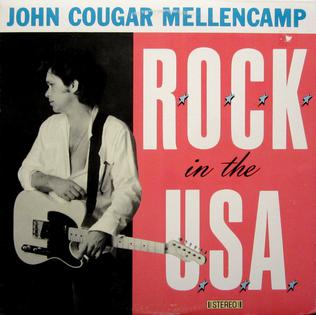
"Crazy Little Thing Called Love" is a song by the British rock band Queen. Written by Freddie Mercury in 1979, the track is included on their 1980 album The Game, and also appears on the band's compilation album, Greatest Hits in 1981. The song peaked at number two in the UK Singles Chart in 1979, and became the group's first number-one single on the Billboard Hot 100 in the US in 1980, remaining there for four consecutive weeks. It topped the Australian ARIA Charts for seven weeks. It was the band's final single release of the 1970s.

"Lost in Love" is a 1980 song recorded by the Australian soft rock group Air Supply. The song was written by group member Graham Russell. The original version of the song appeared on the Life Support album in 1979 and was released as a single in Australia, reaching number 13 on the Kent Music Report. The group re-recorded the song for the album of the same name in 1980 and this version was released as a single in the US, reaching number 3 on the Billboard Hot 100.

"I Was Born to Love You" is a 1985 song by Freddie Mercury, and was released as a single and on the Mr. Bad Guy album. After Mercury's death, Queen re-worked this song for their album Made in Heaven in 1995, by having the other members play their instrumental parts over the original track, transforming the song from a disco song to a rock song. The Queen version from the Made in Heaven album also includes samples of Mercury's ad-lib vocals taken from "A Kind of Magic" and from "Living on My Own".

"I Want to Break Free" is a song by the British rock band Queen, written by their bass guitarist John Deacon. It appears on the album The Works (1984), and was released in three versions: album, single and extended. It came to be included in most live concerts by the group, in several videos and in The Freddie Mercury Tribute Concert where it was sung by Lisa Stansfield.

"One Vision" is a song written and recorded by the British rock band Queen, first released as a single in November 1985 and then included on their 1986 album A Kind of Magic. It was conceived by the group's drummer Roger Taylor.

"Elegantly Wasted" is the title track and first single released from the album Elegantly Wasted by Australian band INXS, released in Europe, Japan, Australia, South Africa, Canada and the United States. The song is said to have been written after Michael Hutchence and Bono from U2 went out for a "night on the town".
"Mountain of Love" is a song written by Harold Dorman. Dorman released his version as a single in 1960. It was originally recorded in late 1959 at the Royal Recording Studios in Memphis before the backing vocals were overdubbed. It performed well, spending 19 weeks on the Billboard Hot 100 chart, peaking at #21 in May 1960, while reaching #7 on the Billboard Hot R&B Sides chart, and #25 on Canada's "CHUM Hit Parade". The song was his only top forty hit on the Billboard Hot 100 and was the highest-charting single of his career.

"It's a Hard Life" is a song by the British rock band Queen, written by lead singer Freddie Mercury. It was featured on their 1984 album The Works, and it was the third single from that album. In 1991 it was included in the band’s second compilation album Greatest Hits II.

"Under the Boardwalk" is a pop song written by Kenny Young and Arthur Resnick and recorded by the Drifters in 1964. It charted at number four on the Billboard Hot 100 chart on August 22, 1964. The song has since been covered by many other artists, with versions by Billy Joel, Bette Midler, Sam & Dave, the Tom Tom Club, the Rolling Stones, Billy Joe Royal, Bruce Willis, Bad Boys Blue, John Mellencamp and Lynn Anderson all charting in the United States or overseas. The song ranked number 489 on Rolling Stone's list of The 500 Greatest Songs of All Time.

"Made in Heaven" is the third single recorded by Freddie Mercury, and his fourth release as a solo artist. Originally featured in Mercury's debut album, the song was slightly modified and published as a 45rpm paired with "She Blows Hot and Cold", described on the record sleeve as 'A Brand New Track'. The single reached #57 on the UK Singles Chart.

"Change" is a song by the British band Tears for Fears. Written by Roland Orzabal and sung by bassist Curt Smith, it was the band's fourth single release. It would eventually become the second hit from their debut LP The Hurting (1983) and second UK Top 5 chart hit, following the success of "Mad World". The song also gave Tears for Fears their first charting single in the United States when it cracked the Billboard Hot 100 in August 1983. "Change" was also a big international success, reaching the Top 40 in numerous countries.

"Women" is a song released by English rock band Def Leppard in 1987 from the album Hysteria. It was the first single of the album released in the United States. The song was also released as a single in Canada, Australia, Japan, and was part of a double-A side single with "Animal" in Germany. In most other parts of the world, "Animal" was the first single released from the album.
"It's Just a Matter of Time" is a popular song written by Brook Benton, Clyde Otis, and Belford Hendricks. The original recording by Benton topped the Billboard Hot R&B Sides chart in 1959 and peaked at No. 3 on the Hot 100 pop chart, the first in a string of hits for Benton that ran through 1970.

"I Don't Believe You Want to Get Up and Dance (Oops!)",, is a 1979 song recorded by the R&B group The Gap Band. Released off their fourth studio album, The Gap Band II, the song and its parent album both achieved commercial success.
"Would You Lay with Me " is a song written by David Allan Coe and recorded by American country music artist Tanya Tucker. It was released in December 1973 as the first single and title track from the album Would You Lay with Me . It topped the U.S. country chart on March 30, 1974, for one week and was Tucker's third number-one song on the chart. On the Billboard Hot 100, the song peaked at number 46. Only her 1975 number-one country hit, "Lizzie and the Rainman", performed better on the pop chart. Coe later recorded the song as the b-side to his 1975 single "You Never Even Called Me by My Name." In 1974, a version by veteran Australian singer Judy Stone reached into the top 5 of the Australian pop charts. Willie Nelson and Waylon Jennings recorded the song on their 1983 album, Take It to the Limit. In 2000, Johnny Cash covered the song on his album, American III: Solitary Man.

"R.O.C.K. in the U.S.A.", subtitled "A Salute to 60's Rock", is a rock song written and performed by John Mellencamp. It was the third single from his 1985 album Scarecrow and a top-ten hit on both the Billboard Hot 100 and Top Rock Tracks charts.

"No More Words" is a song by American new wave band Berlin from their third studio album, Love Life (1984). It was released on February 27, 1984, as the album's lead single. The single was the band's first top-40 entry on the Billboard Hot 100, peaking at number 23 on May 12, 1984. The song was featured in the 1985 film Vision Quest. In the United States, the song was re-released in 1985 as a B-side to Madonna's single "Crazy for You", which was also featured in Vision Quest.

"Love Kills" is a song by Freddie Mercury, and his first song recorded as a solo artist. Written by Mercury and Giorgio Moroder, it was originally used in Moroder's 1984 restoration and edit of Fritz Lang's 1927 silent film Metropolis, as part of the film's new soundtrack. In 1985, the film was nominated at the 5th Golden Raspberry Awards for Worst Musical Score, and the song itself was nominated for Worst Original Song. Nevertheless, the single reached number ten on the UK Singles Chart. The song was never performed live in any concert or event. Queen + Adam Lambert performed the song live for the very first time on the North American leg of their tour in 2014 as a ballad. That version was later reworked by Brian May & Roger Taylor with the original vocals by Mercury for the album Queen Forever in 2014.

"Rocket Man" is a song composed by Elton John and Bernie Taupin and originally performed by Elton John. The song first appeared on 17 April 1972 in the US as the lead single to John's album Honky Château. The song first charted in the UK on 22 April, rising to No. 2 in the UK Singles Chart and No. 6 in the US Billboard Hot 100, becoming a major hit single for John.

The singles discography of American Jazz artist Sarah Vaughan contains 89 singles, two promotional singles and seven other charted songs. Vaughan recorded her first singles in 1946, with her first release being "If You Could See Me Now". Soon after, she her first major chart success on the Billboard pop list with "Tenderly" and "It's Magic." Moving to Columbia Records, she had further pop hits in the late 1940s with covers of "Black Coffee" and "Nature Boy." She had her second top ten hit in 1950 with "(I Love the Girl) I Love the Guy." Vaughan moved to Mercury Records during the 1950s and recorded more pop music. At Mercury, she had her biggest chart success, with the top ten hits "Make Yourself Comfortable" and "Whatever Lola Wants." In 1959, Vaughan's single "Broken Hearted Melody" reached number seven on the Billboard pop chart and became an international success, becoming the biggest single of her career.

















